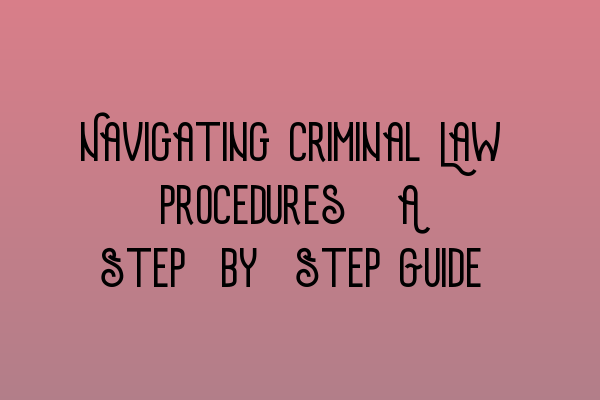Navigating Criminal Law Procedures: A Step-by-Step Guide
Welcome to SQE Criminal Law & Practice Law UK, where we provide comprehensive guidance on criminal law procedures. Whether you are a law student preparing for the SQE exams or a legal professional looking to enhance your knowledge, this step-by-step guide will help you navigate through the intricacies of criminal law procedures.
Understanding the Basics
Before diving into the specifics of criminal law procedures, it’s important to have a solid understanding of the basics. Criminal law is the branch of law that deals with offenses committed against society or the state, and it governs the prosecution and punishment of individuals accused of criminal acts.
If you are a law student preparing for the SQE 1 exams, it’s crucial to practice and test your knowledge regularly. You can find SQE 1 Practice Exam Questions and SQE 1 Practice Mocks FLK1 FLK2 to help you prepare effectively.
The Investigation Stage
The first step in any criminal law procedure is the investigation stage. This is when law enforcement agencies gather evidence, interview witnesses, and collect relevant information to determine whether a crime has been committed and who may be responsible.
Once the investigation is complete, prosecutors will review the evidence and decide whether to initiate criminal proceedings. If you are a legal professional preparing for the SQE 2 exams, you can find valuable resources and preparation courses here.
Initiating Criminal Proceedings
If the decision is made to proceed with a criminal case, the next step is to initiate criminal proceedings. This involves filing charges against the accused and summoning them to appear in court.
At this stage, it is crucial to ensure that proper legal procedures are followed and that the accused’s rights are protected. Familiarizing yourself with the SQE 1 Preparation Courses available here can help you understand the nuances of criminal law procedures.
The Trial Process
Once the accused has been summoned to court, the trial process begins. This is where the prosecution presents the evidence and argues for the guilt of the accused while the defense presents their case to establish the innocence of their client.
During the trial, it’s essential to have a thorough understanding of legal procedures, rules of evidence, and courtroom etiquette. Effective preparation for the SQE exams, including an understanding of the relevant procedures, is crucial to becoming a competent criminal law practitioner.
Sentencing and Appeals
If the accused is found guilty, the next step is sentencing. The judge will consider various factors, including the severity of the crime, the defendant’s criminal history, and any mitigating circumstances, before imposing an appropriate sentence.
It’s important to note that after sentencing, the defendant has the right to appeal the decision if there are grounds for appeal. Understanding the SRA SQE Exam Dates and staying updated with the latest information can assist legal professionals in efficiently managing criminal law cases.
Conclusion
Navigating criminal law procedures can be complex, but with the right knowledge and preparation, you can confidently handle criminal cases. Whether you are a law student preparing for the SQE exams or a legal professional looking to enhance your skills, staying updated with the latest information and resources is essential.
At SQE Criminal Law & Practice Law UK, we offer comprehensive guidance, practice exam questions, and preparation courses to help you succeed in your legal career. Feel free to explore our SQE 1 Preparation Courses and SQE 2 Preparation Courses to ensure you are fully equipped to navigate criminal law procedures effectively.
